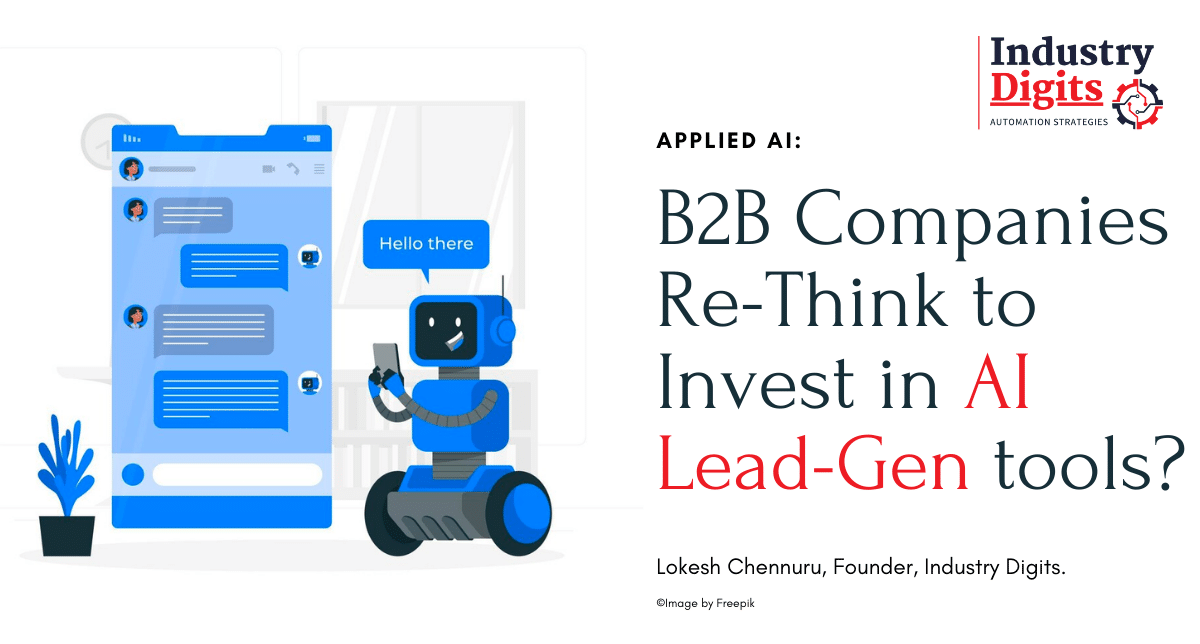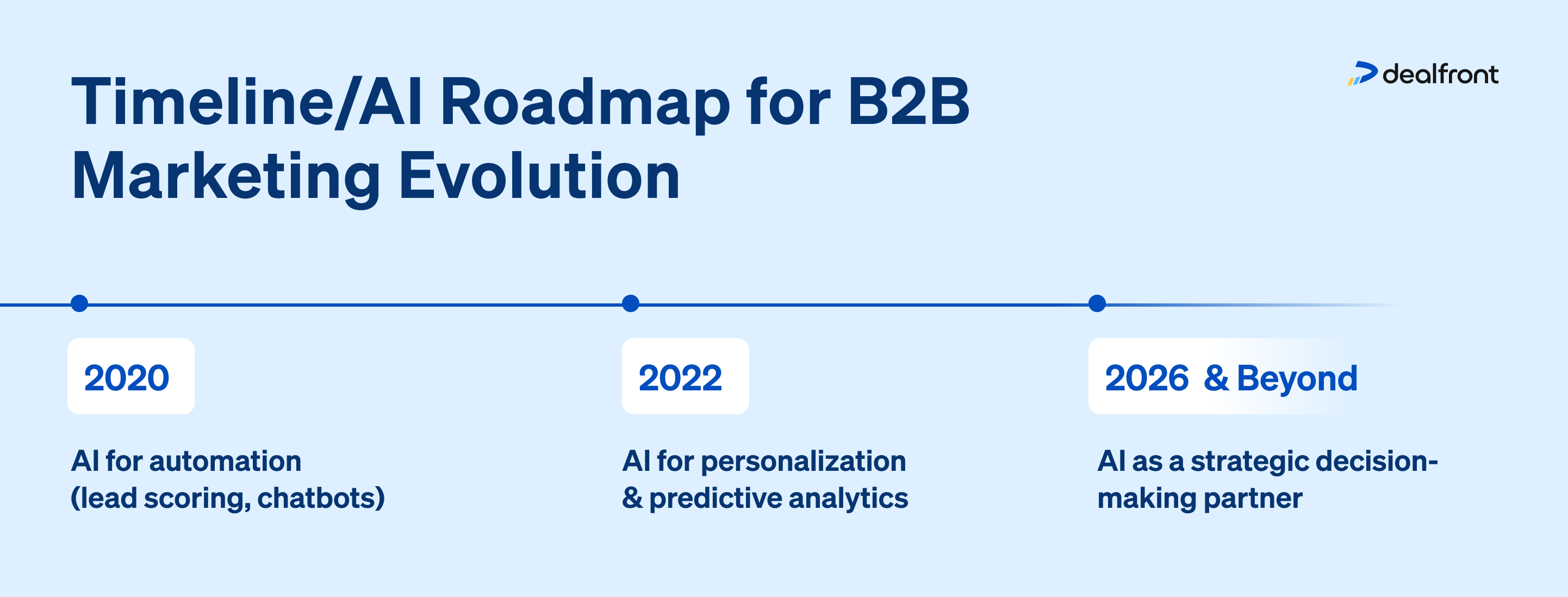The Future of B2B: Using AI Automation to Drive Success
The landscape of B2B is moving as business increasingly turn to AI automation for tactical advantage. This makeover guarantees to improve effectiveness and client engagement via innovative innovations. The integration of these devices is not without its challenges. Comprehending how services can browse this evolving surface will certainly be crucial for future success. What variables will figure out the efficiency of AI in this industry? The solutions may redefine conventional business designs.
Understanding AI Automation in B2B
As services progressively look for effectiveness, understanding AI automation in B2B comes to be vital. AI Automation For B2B. AI automation refers to the use of expert system innovations to improve and streamline company procedures. In the B2B industry, this includes the assimilation of AI tools to take care of jobs such as information evaluation, consumer interactions, and supply chain procedures. By leveraging device discovering and natural language processing, firms can boost precision, minimize human mistake, and quicken decision-making. Additionally, AI automation helps with the handling of huge volumes of data, making it possible for businesses to remove valuable understandings and optimize their operations. As companies navigate this technological landscape, a complete understanding of AI automation's capabilities will certainly equip them to stay responsive and affordable to market needs
Secret Advantages of AI Automation for Businesses
While many services come to grips with increasing operational demands, AI automation presents numerous advantages that can markedly boost their efficiency. One significant benefit is effectiveness; AI systems can execute repeated jobs faster and with greater precision than humans, consequently freeing and minimizing errors up staff members for more strategic initiatives. Additionally, AI automation enables data-driven decision-making by examining substantial datasets rapidly, providing insights that inform business strategies. Cost decrease is one more crucial advantage, as automation lessens labor prices and optimizes source allocation. Furthermore, AI can boost scalability, enabling organizations to adjust to market modifications promptly. Ultimately, the combination of AI automation cultivates technology, making it possible for firms to remain affordable in a swiftly evolving landscape.
Transforming Consumer Experiences With AI
AI is improving consumer experiences by improving and enabling customized communications involvement. Through the execution of predictive analytics, businesses can expect consumer requirements and choices, bring about extra customized solutions. Furthermore, improving assistance processes with AI innovation improves effectiveness and complete satisfaction, inevitably transforming the overall customer journey.
Individualized Communications and Involvement

Predictive Analytics Execution
As businesses significantly seek to boost customer experiences, implementing predictive analytics has emerged as an essential method in the B2B sector. By leveraging data-driven insights, companies can expect consumer requirements and choices, enabling them to customize their offerings a lot more effectively. Predictive analytics uses historic information and sophisticated formulas to forecast future actions, enabling organizations to determine potential difficulties and opportunities. This aggressive strategy not only improves consumer contentment yet likewise promotes commitment by supplying prompt and appropriate services. Additionally, anticipating analytics assists in resource appropriation, guaranteeing that advertising and marketing initiatives are focused on high-value potential customers. Inevitably, the integration of anticipating analytics furnishes B2B companies with the tools necessary to change consumer interactions and drive lasting success in an increasingly competitive landscape.
Improving Assistance Processes
Enhancing customer experiences in the B2B industry prolongs beyond predictive analytics; improving support processes plays a necessary role. By integrating AI-driven services, companies can automate regular inquiries and improve feedback times, causing heightened client contentment. Chatbots and online aides give 24/7 assistance, addressing client needs without delay and reducing the concern on human representatives. This automation enables groups to concentrate on complicated problems, cultivating more significant interactions. AI tools can examine support data to recognize trends and locations for improvement, making sure continual enhancement of service top quality. As companies embrace these technologies, they place themselves as customer-centric and responsive, eventually driving loyalty and company development in an increasingly competitive landscape
Enhancing Procedures and Processes
Streamlining operations and processes in B2B atmospheres is necessary for boosting overall efficiency. By optimizing workflow efficiency and automating regular tasks, companies can reduce manual errors and free up useful resources. This change not just boosts performance yet likewise allows teams to focus on tactical initiatives that drive growth.
Optimizing Workflow Efficiency
Optimizing operations performance is crucial for organizations looking for to minimize functional costs and improve productivity. By analyzing existing procedures, companies can determine bottlenecks and redundancies that hinder efficiency. Carrying out streamlined treatments improves communication and collaboration amongst teams, ensuring that jobs are completed more promptly. Using data-driven insights makes it possible for business to make informed choices that refine procedures additionally. Additionally, taking on integrated modern technologies can assist in smooth information flow, lessening the danger of hold-ups and errors. As organizations embrace these adjustments, they not only cultivate a much more dexterous workplace however also position themselves to react rapidly to market demands. Inevitably, concentrating on workflow performance allows organizations to allot resources properly, driving long-lasting success in an increasingly affordable landscape.
Automating Regular Tasks
Lots of companies are increasingly transforming to automation to handle routine jobs, recognizing its prospective to considerably enhance functional performance. By deploying AI-driven services, business can simplify recurring activities such as data entrance, billing handling, and customer queries. This change not only decreases human mistake yet additionally frees up valuable employee time, allowing team to concentrate on strategic efforts and value-added jobs. Additionally, automation can improve response times and service consistency, causing improved consumer contentment. As companies browse an affordable landscape, leveraging automation for regular jobs comes to be essential for keeping and enhancing process agility. Eventually, this method cultivates technology and drives development, placing companies for long-lasting success in the progressing B2B setting.
Enhancing Decision-Making Via Information Insights
As organizations browse a progressively complicated landscape, leveraging data insights becomes important for informed decision-making. Minarik AI. By making use of ai-driven devices and innovative analytics, organizations can transform raw data right into workable intelligence. This allows them to recognize trends, forecast market changes, and enhance approaches based on real-time info. Improved decision-making procedures rely upon data visualization techniques, enabling stakeholders to quickly analyze complex datasets and make swift, evidence-based options. Furthermore, insights stemmed from client actions and market characteristics encourage companies to tailor their offerings, improving customer complete satisfaction and driving growth. Eventually, taking advantage of information understandings not only enhances decision-making efficacy but also positions businesses to remain affordable in a quickly progressing market
Getting Rid Of Difficulties in AI Application
Although AI application holds the promise of considerable functional enhancements, organizations frequently deal with a myriad of difficulties that can impede progress. Trick obstacles include information top quality problems, as numerous enterprises have problem with irregular or incomplete datasets necessary for efficient AI training. Furthermore, resistance to change within the labor force can hinder the fostering of AI innovations, as employees may be afraid job variation or lack the necessary abilities. Budget constraints additionally present an obstacle, limiting financial investment in the needed framework and ability. In addition, integrating AI systems with existing procedures can be complex, requiring significant time and sources. Overcoming these challenges demands a calculated method that consists of extensive training, adjustment management, and a dedication to continual renovation in AI initiatives
Future Patterns: The Following Frontier in B2B Automation
While the landscape of B2B automation remains to progress, arising trends are poised to redefine just how organizations operate. The combination of innovative expert system will certainly promote much more individualized consumer experiences, allowing businesses to tailor options precisely to client needs. Additionally, the surge of predictive analytics will certainly make it possible for companies to anticipate market changes and enhance decision-making processes. Automation of regular jobs via robot procedure automation (RPA) will certainly boost performance, reducing operational costs considerably. Additionally, the adoption of blockchain modern technology assures boosted openness and security in transactions. As these innovations gain traction, companies will significantly utilize AI-driven understandings to promote partnership, enhance supply chains, and improve overall productivity, noting a transformative change in the B2B landscape.
Often Asked Concerns
What Sorts Of Businesses Can Profit The Majority Of From AI Automation?

How Can Small Companies Apply AI Automation Successfully?
Small companies can apply AI automation effectively by recognizing recurring tasks, picking easy to use devices, making certain adequate training for staff members, and slowly integrating solutions to maximize process while keeping an eye on efficiency and adjusting approaches based upon feedback.
What Are Usual Mistaken Beliefs Regarding AI in B2B?
Common mistaken beliefs about AI in B2B consist of the belief that it is just for large ventures, that it ensures instantaneous results, which it can completely change human decision-making instead of enhancing it.
Just How Does AI Automation Effect Worker Roles and Work Safety And Security?
AI automation improves employee functions by streamlining recurring jobs, fostering performance and innovation. While some concern job loss, it commonly creates opportunities for upskilling and new placements, ultimately improving work security with included worth and performance.
What Abilities Are Required to Take Care Of AI Automation Projects?
To take care of AI automation jobs, people need strong logical abilities, task management expertise, proficiency in data evaluation, understanding of artificial intelligence ideas, reliable interaction capacities, and flexibility to rapidly changing technological atmospheres. These skills ensure effective application.
As services significantly look for performance, understanding AI automation in B2B becomes important. AI automation assists in the handling of large volumes of data, enabling companies to extract important insights and enhance their operations. While several businesses grapple with enhancing operational demands, AI automation presents countless advantages that can considerably enhance their performance. Automation of regular jobs with robotic procedure automation (RPA) will certainly boost effectiveness, minimizing operational costs considerably - Minarik AI. Manufacturing, logistics, and client solution businesses can benefit most This Site from AI automation